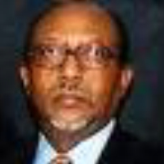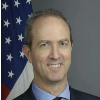Djibouti
Djibouti is small, impoverished, arid country in Northeast Africa with few natural resources and little industry. Since gaining independence from France in 1977, the country’s significance within the international community has grown to depend solely on its geographical location at the southern end of the Red Sea, across from the southwestern tip of the Arabian Peninsula. The capital, Djibouti City, boasts an international port whose transport facilities are used by several landlocked African countries to fly their goods in for re-export.The activity at the port generates much-needed transit taxes and harbour fees for Djibouti. Djibouti also hosts the only American military base in Africa, Camp Lemonnier, which has taken on a more prominent role owing to recent turmoil in Somalia, and the Horn of Africa generally, as well as the Middle East..
Lay of the Land: Djibouti lies in Northeast Africa, also termed the Horn of Africa, on the Gulf of Aden at the southern entrance to the Red Sea. Djibouti has a 195 mile long coastline, and borders Eritrea to the north, Ethiopia to the west, and Somalia to the south. With an area of 8,958 square miles, Djibouti is about the size of the state of Massachusetts. The capital and largest city is Djibouti City, which is home to two-thirds of the population. The rest of the country is divided into five regions: the Ali Sabieh Region, the Arta Region, the Dikhil Region, the Obock Region, and the Tadjourah Region. These outlying five regions are home to the remaining third of the population, most of whom are nomadic pastoralists. Owing to its arid climate of stony desert, scattered plateaus, and highlands, Djibouti produces little food, and must rely on imports to feed its population.
Nomadic people who recorded their history through poetry and song have inhabited Djibouti for thousands of years. In ancient times, Djiboutian people traded hides and skins for the perfumes and spices of ancient Egypt, India, and China. For thousands of years these Djiboutian traders were in close contact with the Arabian Peninsula, which lies only twelve miles across the Gulf of Aden. Due to this close contact with the Arabian Peninsula, the Issa and Afar peoples in this region became among the first Africans to accept Islam.
Since Djibouti achieved independence in June 1977, relations between the U.S. and Djibouti have been amiable. Following Djibouti’s independence from France, Djibouti-U.S. relations have been relatively one-sided, as the U.S. is a principal provider of humanitarian assistance for famine relief, and sponsors health care, education, good governance, and security assistance programs. The Djibouti government has generally been supportive of U.S. interests within the country, as demonstrated by President Guelleh’s offer of support from his nation in the U.S. initiated War on Terror in 2001,and especially with the allowance of the U.S. constructing the military base Camp Lemonnier on Djibouti land.
In recent years, Djibouti’s strategic location on the Gulf of Aden, across from the Southern tip of the Arabian Peninsula, has made it more important to U.S. policy in North Africa and the Middle East. Djibouti has allowed the U.S. military, as well as forces from other nations, access to its port and airport facilities. The Djiboutian Government has been very supportive of U.S. interests, particularly during the Gulf War of 1990-1991 and after the terrorist attacks of September 11, 2001. However, in early 2003, Djibouti was among the many countries that opposed military action against Iraq without a United Nations resolution. In 2002, Djibouti agreed to host a U.S. military presence at Camp Lemonnier, a former French Foreign Legion base outside the capital that now houses approximately 1,800 American personnel. The only U.S. military base in Africa, Camp Lemonnier is a U.S. Navy base, and is headquarters of U.S. military operations in the horn of Africa. U.S. service members provide humanitarian support and development and security assistance to people and governments of the Horn of Africa and Yemen.
Djibouti is a poverty stricken nation with few natural resources and little industry. The country’s greatest resource, in fact, is its strategic location on the Gulf of Aden at the southern entrance to the Red Sea. As a result, the economy of Djibouti is based on service activities connected with international maritime trade. Imports and exports from landlocked neighbor Ethiopia represent 85% of port activity at Djibouti’s container terminal. Djibouti provides services as both a transit port for the region and an international transshipment and refueling center.
Djibouti Government Refuses Somali Refugees
Djibouti is a republic with a strong elected president and a weak legislature. In 2005, President Ismail Omar Guelleh won reelection unopposed, because the opposition party boycotted the polls. International observers considered the election to be generally free and fair. However, there is no independent electoral commission, so voting is vulnerable to abuse and manipulation. The civilian authorities generally maintained effective control of the security forces. The human-rights record of the authoritarian regime of previous ruler, Hassan Gouled Aptdion, came increasingly under attack in the late-1980s and 90s, with allegations of beatings, rapes, arbitrary, prolonged, and incommunicado detentions, extra-judicial killings and disappearances of political/ethnic opponents of Gouled, and union leaders. Journalists have also been harassed, intimidated, and detained.
Jerrold M. North
 Olhaye, Roble
Olhaye, Roble
Roble Olhaye, who in addition to being Djibouti’s ambassador to the U.S. is also ambassador to Canada and Permanent Representative of Djibouti to the United Nations, was born in 1944. Olhaye graduated from the Commercial School of Addis Ababa, Ehtiopia, in 1964 with an Intermediate Diploma in Commerce. He qualified as a professional accountant in England in 1972. Olhaye began his career in 1964, holding positions in auditing, accountancy and taxation in Ethiopia. He stayed in that field until 1973, when he was appointed Regional Chief Accountant for TAW International Leasing Corporation in Nairobi. He became Financial Director, Africa, for that firm in 1975. In 1982, he founded the Banque de Djibouti et du Moyen Orient, S.A., as a joint venture with another bank in the Middle East. Earlier, he had served as an independent consultant concentrating on financial issues.
- Table of Contents
- News
- Overview
- Basic Information
- History
- Newspapers
- History of U.S. Relations with Djibouti
- Current U.S. Relations with Djibouti
- Where Does the Money Flow
- Controversies
- Human Rights
- Debate
- Past Ambassadors
- Ambassador to the U.S.
- Embassy Web Site in the U.S.
- Comments
- Leave a comment
U.S. Ambassador to Djibouti

Thomas P. Kelly III appeared before the Senate Foreign Affairs Committee on May 13, 2014, as it considered his nomination, five weeks earlier, by President Barack Obama to be the U.S. Ambassador to Djibouti, a small East African nation that hosts Camp Lemonnier, headquarters for U.S. Africa Command’s Combined Joint Task Force – Horn of Africa, the only U.S. military forward operating site in sub-Saharan Africa. It would be the first ambassadorial posting for the career civil servant.
Kelly grew up in Manhattan Beach, California, and attended college at Georgetown, earning a B.S. in Foreign Service and an M.A. in Latin American Studies in 1984.
He joined the State Department in 1985, with his first overseas posting coming that year in San Salvador, El Salvador, where he served for two years. He returned to Washington in 1988, and served in the Bureau of Economic and Business Affairs. Then in 1990, he went to Santiago, Chile, staying there until 1993. The following year, he took time out to earn another degree, this one an M.A. in economics from Stanford. After that, he was sent to Paris, where he was trade attaché until 1998.
Kelly returned to Washington to be director for Japan Policy Planning at the Office of the United States Trade Representative. He held that post until 2000, when he returned to Latin America, this time to Ecuador, where he was the economic officer and subsequently economic counselor at the embassy in Quito.
In 2004, Kelly was named deputy chief of mission for the embassy in Vilnius, Lithuania, staying there until 2010, when he assumed a similar post in Buenos Aires, Argentina. Kelly was then named consul general in São Paulo, Brazil, remaining there until the following year.
He then returned to Washington, where he was acting assistant secretary (principal deputy assistant secretary) for the State Department’s Bureau of Political-Military Affairs. In that role, he worked in coordination with Defense Department officials on regional security issues. Among these were maritime security issues, such as pirates off the coast of Somalia, making him familiar with the region of Africa in which he is to serve.
Kelly and his wife, Elsa Amaya-Kelly, have a son, Sean, and a daughter, Chantal. He speaks Spanish, Portuguese, French and Lithuanian.
-Steve Straehley
To Learn More:
Statement of Thomas P. Kelly before the Senate Foreign Relations Committee (pdf)
morePrevious U.S. Ambassador to Djibouti

A career member of the Senior Foreign Service, Geeta Pasi received her first-ever nomination to serve as ambassador—to the small but strategically-located East African nation of Djibouti—in April 2011.
Djibouti is small, impoverished, arid country in Northeast Africa with few natural resources and little industry. Since gaining independence from France in 1977, the country’s significance within the international community has grown to depend solely on its geographical location at the southern end of the Red Sea, across from the southwestern tip of the Arabian Peninsula. The capital, Djibouti City, boasts an international port whose transport facilities are used by several landlocked African countries to fly their goods in for re-export.The activity at the port generates much-needed transit taxes and harbour fees for Djibouti. Djibouti also hosts the only American military base in Africa, Camp Lemonnier, which has taken on a more prominent role owing to recent turmoil in Somalia, and the Horn of Africa generally, as well as the Middle East..
Lay of the Land: Djibouti lies in Northeast Africa, also termed the Horn of Africa, on the Gulf of Aden at the southern entrance to the Red Sea. Djibouti has a 195 mile long coastline, and borders Eritrea to the north, Ethiopia to the west, and Somalia to the south. With an area of 8,958 square miles, Djibouti is about the size of the state of Massachusetts. The capital and largest city is Djibouti City, which is home to two-thirds of the population. The rest of the country is divided into five regions: the Ali Sabieh Region, the Arta Region, the Dikhil Region, the Obock Region, and the Tadjourah Region. These outlying five regions are home to the remaining third of the population, most of whom are nomadic pastoralists. Owing to its arid climate of stony desert, scattered plateaus, and highlands, Djibouti produces little food, and must rely on imports to feed its population.
Nomadic people who recorded their history through poetry and song have inhabited Djibouti for thousands of years. In ancient times, Djiboutian people traded hides and skins for the perfumes and spices of ancient Egypt, India, and China. For thousands of years these Djiboutian traders were in close contact with the Arabian Peninsula, which lies only twelve miles across the Gulf of Aden. Due to this close contact with the Arabian Peninsula, the Issa and Afar peoples in this region became among the first Africans to accept Islam.
Since Djibouti achieved independence in June 1977, relations between the U.S. and Djibouti have been amiable. Following Djibouti’s independence from France, Djibouti-U.S. relations have been relatively one-sided, as the U.S. is a principal provider of humanitarian assistance for famine relief, and sponsors health care, education, good governance, and security assistance programs. The Djibouti government has generally been supportive of U.S. interests within the country, as demonstrated by President Guelleh’s offer of support from his nation in the U.S. initiated War on Terror in 2001,and especially with the allowance of the U.S. constructing the military base Camp Lemonnier on Djibouti land.
In recent years, Djibouti’s strategic location on the Gulf of Aden, across from the Southern tip of the Arabian Peninsula, has made it more important to U.S. policy in North Africa and the Middle East. Djibouti has allowed the U.S. military, as well as forces from other nations, access to its port and airport facilities. The Djiboutian Government has been very supportive of U.S. interests, particularly during the Gulf War of 1990-1991 and after the terrorist attacks of September 11, 2001. However, in early 2003, Djibouti was among the many countries that opposed military action against Iraq without a United Nations resolution. In 2002, Djibouti agreed to host a U.S. military presence at Camp Lemonnier, a former French Foreign Legion base outside the capital that now houses approximately 1,800 American personnel. The only U.S. military base in Africa, Camp Lemonnier is a U.S. Navy base, and is headquarters of U.S. military operations in the horn of Africa. U.S. service members provide humanitarian support and development and security assistance to people and governments of the Horn of Africa and Yemen.
Djibouti is a poverty stricken nation with few natural resources and little industry. The country’s greatest resource, in fact, is its strategic location on the Gulf of Aden at the southern entrance to the Red Sea. As a result, the economy of Djibouti is based on service activities connected with international maritime trade. Imports and exports from landlocked neighbor Ethiopia represent 85% of port activity at Djibouti’s container terminal. Djibouti provides services as both a transit port for the region and an international transshipment and refueling center.
Djibouti Government Refuses Somali Refugees
Djibouti is a republic with a strong elected president and a weak legislature. In 2005, President Ismail Omar Guelleh won reelection unopposed, because the opposition party boycotted the polls. International observers considered the election to be generally free and fair. However, there is no independent electoral commission, so voting is vulnerable to abuse and manipulation. The civilian authorities generally maintained effective control of the security forces. The human-rights record of the authoritarian regime of previous ruler, Hassan Gouled Aptdion, came increasingly under attack in the late-1980s and 90s, with allegations of beatings, rapes, arbitrary, prolonged, and incommunicado detentions, extra-judicial killings and disappearances of political/ethnic opponents of Gouled, and union leaders. Journalists have also been harassed, intimidated, and detained.
Jerrold M. North
 Olhaye, Roble
Olhaye, Roble
Roble Olhaye, who in addition to being Djibouti’s ambassador to the U.S. is also ambassador to Canada and Permanent Representative of Djibouti to the United Nations, was born in 1944. Olhaye graduated from the Commercial School of Addis Ababa, Ehtiopia, in 1964 with an Intermediate Diploma in Commerce. He qualified as a professional accountant in England in 1972. Olhaye began his career in 1964, holding positions in auditing, accountancy and taxation in Ethiopia. He stayed in that field until 1973, when he was appointed Regional Chief Accountant for TAW International Leasing Corporation in Nairobi. He became Financial Director, Africa, for that firm in 1975. In 1982, he founded the Banque de Djibouti et du Moyen Orient, S.A., as a joint venture with another bank in the Middle East. Earlier, he had served as an independent consultant concentrating on financial issues.
Comments
U.S. Ambassador to Djibouti

Thomas P. Kelly III appeared before the Senate Foreign Affairs Committee on May 13, 2014, as it considered his nomination, five weeks earlier, by President Barack Obama to be the U.S. Ambassador to Djibouti, a small East African nation that hosts Camp Lemonnier, headquarters for U.S. Africa Command’s Combined Joint Task Force – Horn of Africa, the only U.S. military forward operating site in sub-Saharan Africa. It would be the first ambassadorial posting for the career civil servant.
Kelly grew up in Manhattan Beach, California, and attended college at Georgetown, earning a B.S. in Foreign Service and an M.A. in Latin American Studies in 1984.
He joined the State Department in 1985, with his first overseas posting coming that year in San Salvador, El Salvador, where he served for two years. He returned to Washington in 1988, and served in the Bureau of Economic and Business Affairs. Then in 1990, he went to Santiago, Chile, staying there until 1993. The following year, he took time out to earn another degree, this one an M.A. in economics from Stanford. After that, he was sent to Paris, where he was trade attaché until 1998.
Kelly returned to Washington to be director for Japan Policy Planning at the Office of the United States Trade Representative. He held that post until 2000, when he returned to Latin America, this time to Ecuador, where he was the economic officer and subsequently economic counselor at the embassy in Quito.
In 2004, Kelly was named deputy chief of mission for the embassy in Vilnius, Lithuania, staying there until 2010, when he assumed a similar post in Buenos Aires, Argentina. Kelly was then named consul general in São Paulo, Brazil, remaining there until the following year.
He then returned to Washington, where he was acting assistant secretary (principal deputy assistant secretary) for the State Department’s Bureau of Political-Military Affairs. In that role, he worked in coordination with Defense Department officials on regional security issues. Among these were maritime security issues, such as pirates off the coast of Somalia, making him familiar with the region of Africa in which he is to serve.
Kelly and his wife, Elsa Amaya-Kelly, have a son, Sean, and a daughter, Chantal. He speaks Spanish, Portuguese, French and Lithuanian.
-Steve Straehley
To Learn More:
Statement of Thomas P. Kelly before the Senate Foreign Relations Committee (pdf)
morePrevious U.S. Ambassador to Djibouti

A career member of the Senior Foreign Service, Geeta Pasi received her first-ever nomination to serve as ambassador—to the small but strategically-located East African nation of Djibouti—in April 2011.







Comments